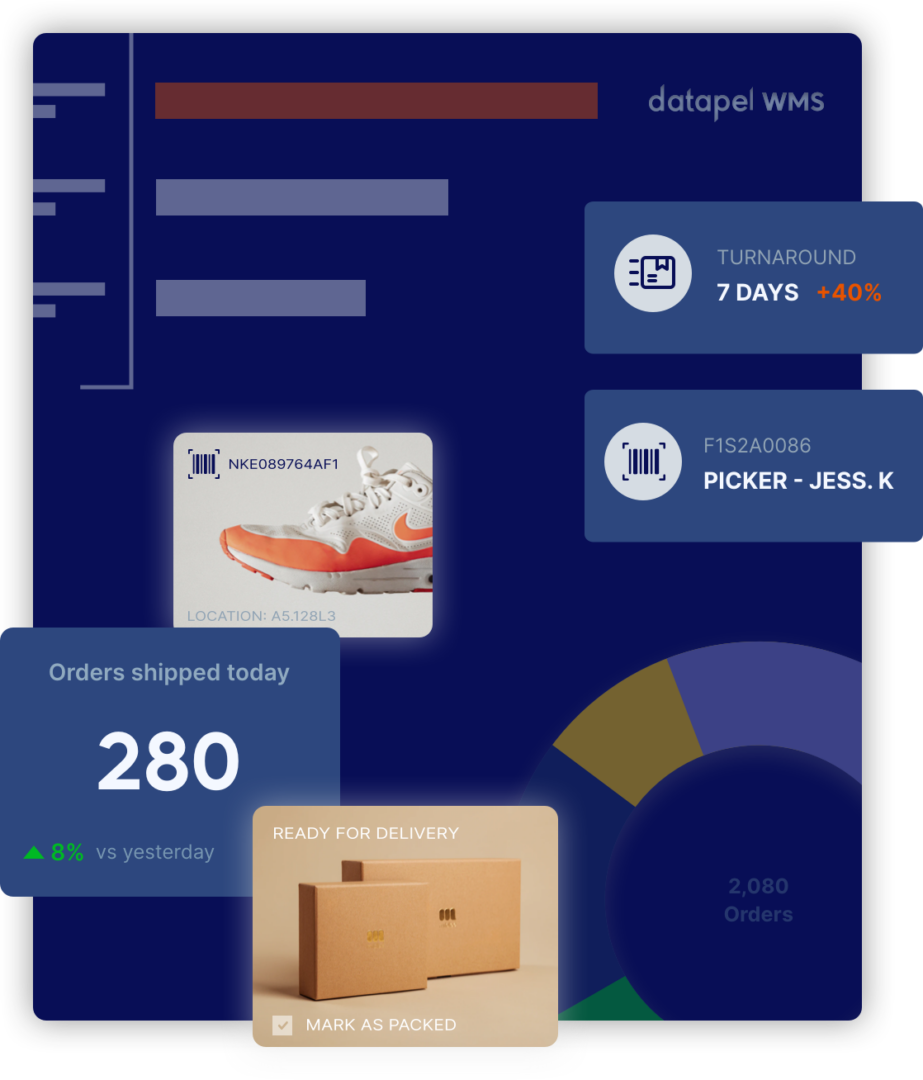How eCommerce Fulfilment Technology Drives Success
Contents
In today’s fast-paced eCommerce world success is more than just great products or a nice online store.
It’s about delivering amazing customer experiences, optimising operations, storing inventory efficiently, and scaling effectively. At the heart of achieving these is leveraging the right technology. 83% of brands reported increased revenue in 2023 so it’s clear the right tools can make a big impact on ecommerce order fulfillment efficiency and overall business success.
But how do you get your eCommerce operations ready for growth?
Let’s see how eCommerce fulfilment technology, particularly Warehouse Management Systems (WMS) and automation can be the secret to your business.
Understanding eCommerce Fulfilment

Fulfilment
Fulfilment is key to any online business. It’s everything from storing stock and processing orders to shipping to customers. More than just logistics, good fulfilment is about a smooth customer experience. When done well it means accurate and on-time deliveries, happy customers and loyalty.
A good fulfilment strategy can help streamline, save costs and be a competitive advantage. For more on building a good fulfilment plan click here.
Your Fulfilment Plan
Building a fulfilment strategy starts with understanding your business’s specific needs – product range, order volume and customer expectations. Key elements are inventory management, choosing the right fulfilment model (in-house or third-party logistics 3PL) and logistics like picking, packing and shipping.
A good strategy will save you costs, and improve order accuracy and customer gratification.
Choosing Your Fulfilment Model
Choosing the right fulfilment model for your business – in-house, 3PL or dropshipping – depends on control, cost, scalability and customer service.
In-house gives you full control but more investment, 3PL gives you scalability and expertise but requires careful partner selection. Dropshipping is a low-risk option for smaller businesses but less control over the process. The right choice for your business and growth goals.
The Power of a Warehouse Management System (WMS)

A Warehouse Management System (WMS) is the foundation of any successful fulfilment strategy.
It helps eCommerce businesses simplify their operations, reduce errors and improve overall efficiency. A WMS like Datapel’s provides real-time inventory tracking, optimised pick and pack workflows and enhanced order accuracy—all essential for keeping up with customer expectations and market demand.
How Datapel’s WMS Helps Businesses Simplify Their Operations:
- Real-Time Inventory Tracking: Stay ahead by knowing exactly what’s in stock and where it’s located. Real-time visibility into inventory means businesses can respond quickly to changes in demand and prevent overstocking or stockouts that can impact customer experience. Additionally, using historical sales data is crucial for accurate demand forecasting and inventory planning, helping to analyse customer behaviour and market trends.
- Optimised Pick and Pack Workflows: Streamlining the pick and pack process reduces the time it takes to fulfil orders, resulting in faster delivery times and happier customers. Efficient workflows mean less wasted time and resources.
- Enhanced Order Accuracy: Mistakes in order fulfillment can be costly. By automating inventory checks and ensuring accurate order processing Datapel’s WMS minimises errors and leads to increased customer loyalty and repeat business.
Automation in Fulfilment

Automation is changing how eCommerce businesses manage inventory and orders. By automating mundane and repetitive tasks businesses can reduce human error, speed up fulfilment operations and free up resources for more strategic activities.
Examples of Automated Processes:
- Picking, Packing, Shipping and Delivery: Automated systems can simplify these processes, get orders out faster and reduce the chance of mistakes. Automation can also assist in managing store inventory more efficiently by optimising storage and organisation. With automation, your team can focus on more value-added tasks while the technology does the heavy lifting.
- Error Reduction and Faster Operations: Automation minimises costly mistakes that can lead to returns or customer dissatisfaction. Faster operations not only increases efficiency but also customer loyalty by getting orders out quicker.
In a world where 27% of brands offer site-wide free shipping for domestic orders operational efficiency and cost management has never been more important. Automation combined with a full fulfilment strategy and WMS can help balance these two.
eCommerce Platforms and Fulfilment Systems

Integration between eCommerce platforms and fulfilment systems is no longer a nice to have—it’s a must-have. 64% of brands plan to add at least one new sales channel in 2024 so that managing inventory across multiple platforms is key.
Datapel Solutions Integrates with:
- Enhanced Workflow Efficiency: Datapel solutions integrates with major eCommerce platforms, the flow of information between your online store and warehouse is seamless. This means better order management, less errors and faster fulfilment. Fulfilment centres play a crucial role in facilitating faster last-mile delivery and improving order processing efficiency.
- Real-Time Updates and Accurate Inventory Management: Integration provides real-time updates so your inventory levels are always up to date. This prevents overselling and allows for more strategic decision-making with the latest information.
Data Analytics and Historical Sales Data

Data analytics is the engine behind informed decision-making in eCommerce fulfilment and supply chain. By analysing trends, businesses can forecast demand, optimise stock and reduce costs—key to staying competitive.
Using Data to Improve Fulfilment Processes:
- Demand Forecasting and Stock Optimisation: By using data businesses can predict what products will be in demand and when. This prevents overstocking or understocking, reduces holding costs and maximises sales opportunities. Additionally, data analytics plays a crucial role in optimising eCommerce order fulfilment by ensuring that the right products are available at the right time, enhancing overall efficiency.
- Customer Satisfaction and Operational Efficiency: Knowing customer buying patterns and preferences allows businesses to personalise and get orders out faster, directly impacting customer satisfaction and loyalty.
Choosing the Right Technology for Your Business

Choosing the right fulfilment technology is more than just choosing the latest software. It requires a clear understanding of your business, growth stage and strategic goals.
Key Considerations When Choosing Fulfilment Technology:
- Scalability and Flexibility: Your business needs a solution that can grow with you. Whether you’re a small eCommerce store or a rapidly growing enterprise the technology you choose should be able to adapt to your changing needs. Datapel’s WMS is designed to support businesses at all growth stages, scalable and flexible solutions that can be tailored to your unique operational requirements.
- Integration Capabilities: Make sure the technology integrates with your existing systems and can adapt as you add new sales channels or enter new markets. 21% of brands expanded into fulfilling orders in a new country in 2024 so the importance of robust and adaptable technology can’t be overstated.
End
Technology is no longer nice to have for eCommerce—it’s necessary. From Warehouse Management Systems and automation to integration and data analytics, the right tools can simplify, save and control inventory. As you plan for growth think about how Datapel can help. With our solutions, your eCommerce business will be ready for the challenges and turn them into opportunities.
Get in touch with Datapel today and let’s make inventory management work for you!
Frequently Asked Questions
What is fulfilment technology?
Fulfilment technology includes tools like Warehouse Management Systems (WMS) and automation that optimise eCommerce operations from inventory management to order delivery.
What is a fulfilment tech?
Fulfilment tech refers to software and systems, such as WMS and automation tools, that streamline order processing, inventory management, and shipping in eCommerce.
What technology does eCommerce use?
eCommerce uses technologies like WMS, order management systems, automation, data analytics, and integration tools to manage inventory, orders, and customer experience.
What are the four types of e-commerce?
The four types are B2C (Business to Consumer), B2B (Business to Business), C2C (Consumer to Consumer), and C2B (Consumer to Business).
What is the basic technology of e-commerce?
Basic eCommerce technology includes WMS, shopping cart software, payment gateways, data analytics, and integration tools to manage online sales and fulfilment.

In my role, I oversee the development of insightful blogs that delve into the intricacies of warehouse management. Each piece reflects my dedication to empowering businesses through informative content. Through my team’s extensive experience in the industry, we aim to bring clarity to the complexities of WMS, helping businesses make informed decisions.
Join me on a journey through the ever-evolving landscape of warehouse technology as we explore the latest trends, industry insights, and practical tips to streamline your operations. Feel free to connect, and let’s embark on a collaborative exploration of how WMS can redefine your business efficiency.
Cheers to innovation, efficiency, and the exciting world of warehouse management!







